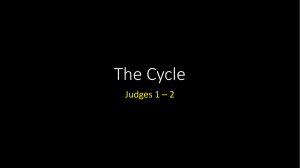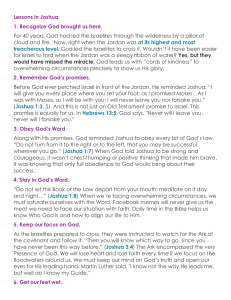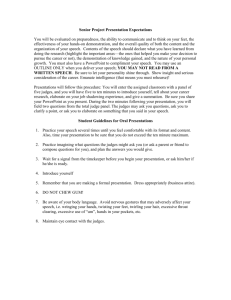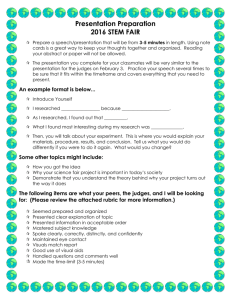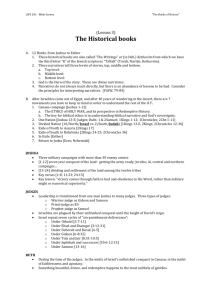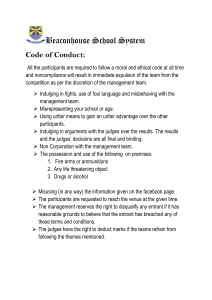Appendix 2 — Looking Closer at the Story (Lesson 08)
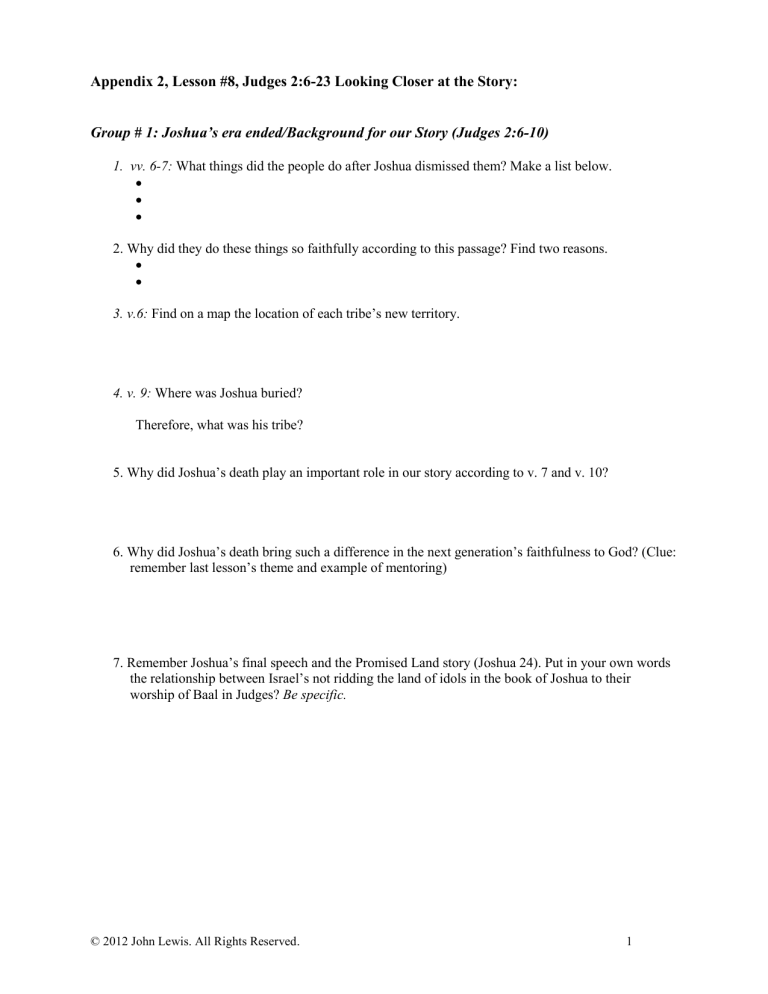
Appendix 2, Lesson #8, Judges 2:6-23 Looking Closer at the Story:
Group # 1: Joshua’s era ended/Background for our Story (Judges 2:6-10)
1. vv. 6-7: What things did the people do after Joshua dismissed them? Make a list below.
2. Why did they do these things so faithfully according to this passage? Find two reasons.
3. v.6: Find on a map the location of each tribe’s new territory.
4. v. 9: Where was Joshua buried?
Therefore, what was his tribe?
5. Why did Joshua’s death play an important role in our story according to v. 7 and v. 10?
6. Why did Joshua’s death bring such a difference in the next generation’s faithfulness to God? (Clue: remember last lesson’s theme and example of mentoring)
7. Remember Joshua’s final speech and the Promised Land story (Joshua 24). Put in your own words the relationship between Israel’s not ridding the land of idols in the book of Joshua to their worship of Baal in Judges? Be specific.
© 2012 John Lewis. All Rights Reserved. 1
Group #2: Israel’s Sin and Idolatry/Baal Worship (Judges 2:11-23)
1.
What repeated words in our passage today relate to sin and idolatry ? List them below.
2.
What do they tell us about who the Baals are or how we should or should not relate to idols?
3.
What does this language regarding Israel’s action suggest about the nature of sin from God’s perspective?
4.
See article in the appendix on Baal and look up some of these references to Baal from a concordance: Ju. 6:25-32, 1 Ki. 16:31-32, 2 Ki 10:18-28. How do these verses help you understand the Canaanites and their religion better, and how they were a snare to the Israelites?
Write your ideas below.
5.
In light of all you have discovered above, why would God describe the Israelite’s worship of the
Baals as adultery ? List several potential reasons.
6. If idolatry could easily seep into the hearts and homes of the Israelites in the Promised Land, what does that warn us about the nature of idolatry, its potential danger for future generations?
7. vv . 20-23: What is said here about the reasons why Israel was being attacked by her neighbors?
8. The story says that the Israelites “abandoned” God and followed the Baals. Looking at all the
“evidence” of the bible passage, of the sin cycle in the book of Judges, do you think this means they no longer worshipped Yahweh at all, that they had completely rejected Him and disowned
Him, OR do you think they worshipped Yahweh AND the Baals? Why might your answer to this question be important?
“Purity of heart is to will one thing.”
Soren Kierkegaard
© 2012 John Lewis. All Rights Reserved. 2
Group #3: God’s Emotional Response to Israel’s Rebellion – Anger (Judges 2:11-20)
1.
See vv. 12, 14, 20 and note that God is described three times as having Anger .
Does the fact that God is “angry” surprise you?
Why or why not?
Why do you think God is angry, and why is His anger justified?
How does His anger lead God to act toward Israel in this passage?
Does that surprise you?
How would you now describe the part anger plays in God’s character? 1-2 sentences.
Is there evidence that something other than anger motivated God?
What is it?
2.
Which of the repeated words in our passage today seem related to God’s anger? List them below.
3. vv. 22-23: Didn’t God tell Joshua earlier to wipe out all the gods/peoples of Canaan? Did God change His mind in these verses?
What reason is suggested in these verses for the continued existence of idolaters in the land?
© 2012 John Lewis. All Rights Reserved. 3
.
Group #4: God’s Active Responses to Israel’s Rebellion – Judgment…and then the Judges
(Judges 2:11-19)
1.
What repeated words in our passage today relate to God’s judgment ? Especially focus on the verbs. List them below.
2.
Who/what were the instruments that God used for His judgment?
What do these instruments tell us about the nature of God and of His judgment?
3.
In view of today’s passage and the whole book of Judges and the cycle of their sin, how would you briefly summarize both the nature and the purpose of God’s judgment toward Israel?
4.
How does this passage in Judges help us understand God’s intervention with His people to accomplish His will?
5.
Make a list of the repeated and important words describing the judges God sent? (vv. 16-19)
6.
Make a list of general characteristics and responsibilities of a judge based on what you know from the book of Judges.
7. Who might be an example of a judge in your culture?
© 2012 John Lewis. All Rights Reserved. 4

